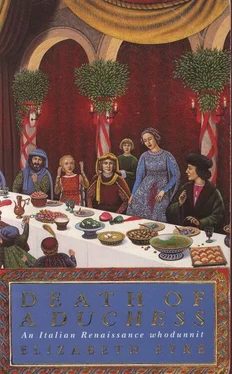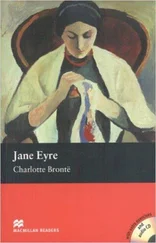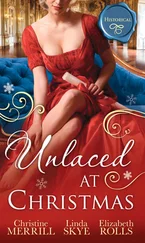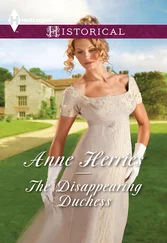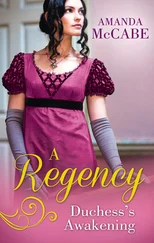Elizabeth Eyre - Death of a Duchess
Здесь есть возможность читать онлайн «Elizabeth Eyre - Death of a Duchess» весь текст электронной книги совершенно бесплатно (целиком полную версию без сокращений). В некоторых случаях можно слушать аудио, скачать через торрент в формате fb2 и присутствует краткое содержание. Год выпуска: 0101, Жанр: Исторический детектив, на английском языке. Описание произведения, (предисловие) а так же отзывы посетителей доступны на портале библиотеки ЛибКат.
- Название:Death of a Duchess
- Автор:
- Жанр:
- Год:0101
- ISBN:нет данных
- Рейтинг книги:5 / 5. Голосов: 1
-
Избранное:Добавить в избранное
- Отзывы:
-
Ваша оценка:
- 100
- 1
- 2
- 3
- 4
- 5
Death of a Duchess: краткое содержание, описание и аннотация
Предлагаем к чтению аннотацию, описание, краткое содержание или предисловие (зависит от того, что написал сам автор книги «Death of a Duchess»). Если вы не нашли необходимую информацию о книге — напишите в комментариях, мы постараемся отыскать её.
Death of a Duchess — читать онлайн бесплатно полную книгу (весь текст) целиком
Ниже представлен текст книги, разбитый по страницам. Система сохранения места последней прочитанной страницы, позволяет с удобством читать онлайн бесплатно книгу «Death of a Duchess», без необходимости каждый раз заново искать на чём Вы остановились. Поставьте закладку, и сможете в любой момент перейти на страницу, на которой закончили чтение.
Интервал:
Закладка:
Already goose fat had been smeared on burns, kitchen boys rubbed their kicked bottoms or the bruises from ladles, one cook was so drunk his knives had been taken from him; and the cage of small birds, waiting to be popped into the baked pastry coffin and later to entertain the company by flying out when it was cut open, was knocked over onto the floor, and burst, filling the pastry-kitchen with the hustle of wings. Birds flew into the fires, banged against the shutters, tried to escape up the chimneys, knocked linen caps askew, were panicked by flying aprons, and muted into everything. A tart of little jellies in almond milk in the shape of various animals was luckily already coloured with saffron. There was otherwise a great wiping, scraping and covering with sauces.
In another part of the castle, a white palfrey was still having its mane and tail plaited with ribbons by grumbling grooms. It was well used to the process, and did no more than step sideways on someone’s foot. Out in the yard, painters put the last touches of silver to the azure cut-outs of wooden waves, harassed by the carpenter anxious to fix the waves to a boat whose wooden wheels they were meant to hide. The boat had already capsized twice and a boy with a stinking gluepot was aboard fixing sails again. In a room near Sigismondo’s a number of dwarves were putting on gaudy costumes, posing in feathered hats and squabbling à l’outrance as to who should wear the one with plumes dyed superbly scarlet. Two dwarves sat in peaceable silence in a corner, mending long chains of iron-grey paper, rustling like a nest of mice as they worked.
These and other preparations were given terminal urgency by the news that the Duke and Duchess had entered the hall and taken their places under the canopy. Halfway down one wall, the musicians’ gallery jutted out. The players operated under difficulty, for they must play loudly enough to be heard but not so loud as to interfere with conversation, and besides, the Duke’s reputation as a patron of the arts absolutely required that as well as a harp, a cithern, several lutes and trumpets and a horn, his orchestra should be modern enough to possess a clavicembalo, which many thought surpassed the organ for its variety of notes. In consequence they were so cramped that a trumpet player had caught his instrument in a garland during the prolonged fanfare that heralded and accompanied the Duke’s entrance. He was having trouble freeing it from a young thicket of bay and a number of loops of ribbon.
Trailing ribbons were a constant feature this evening. In an anteroom off the great hall, seven girls were twining green, silver and blue ribbons round their bare arms and, in spite of the fire blazing in the hearth, were delaying the moment when they would have to strip to the layer of gauze that provided the minimum of decency. At a wedding feast for a lady who had been married before, no one expected more than the minimum of decency, and before the evening should be over, a good deal of indecency was confidently expected.
Rumours of the Duke’s anger and its consequences for the di Torre and Bandini families had reached everyone there, and indeed the absence of some of the kinsfolk of the two parties meant that some guests sat at higher places than they could have hoped for. Speculation about the fate of Cosima di Torre was a hushed undercurrent in the talk. No one among friends of the two enemies dared make partisan remarks in the presence of the Duke. Heads were perpetually being turned to study his expression, although it disappointingly maintained a steady amiability. He sat, after all, next to the bride. Heads turned also to stare at the Duke’s agent, the man from nowhere, so hard to place socially that it had taken a directive from the Duke himself for his steward to find him room at one of the long side tables. Courtiers nearby eyed him as if an executioner sat at meat beside them, though he wore good velvet and linen and bore himself in modest quiet.
An uncouth servant stood behind him, but it was the man himself who held the eye. Mysteries might amuse but secrets were made to be investigated. Someone had heard he was a soldier who had saved the Duke’s life a good few years ago before he inherited his present rank. Ladies pointed out, in support of this tale, the breadth of this man’s shoulders. He was clearly a man of the sword. Others objected. His shaven head made him resemble a man of the cloth. One lady was visited by the conviction that he was a Templar, and this gained credence: there was very little, after all, that could not be believed of the Templars.
The Lady Cecilia, in whose honour the Duchess gave this feast, was thought a little vivacious for a new bride, even one who was bride for the third time. Her first husband, as Sigismondo could gather from talk along the table, had been an elderly lord believed to have died of ecstasy in her arms. The second, younger, had had the ineptitude to break his neck in a boar hunt. The third, middle-aged and heavily built, florid, had black eyebrows bristling over small black eyes, and devotedly watched his wife’s face and other parts of her that were exposed to view. When enough wine had been drunk to lower the moral tone of the talk, speculation began on how long he would last before going the way of the first husband. The Lady Cecilia glanced at him often with arch promise, and would turn again to the Duke with a warmth that implied a generosity with such promises.
The Duchess did not notice or did not mind, or did not wish it to be thought that she minded. Her wedding celebrations had been far gaudier than this and were fondly remembered by the citizens of Rocca, or by such who could remember anything after three days and nights of the fountain in the great square of St Agnes running wine. She had had better luck than the Duke’s first wife, too, presenting him with a son only last summer, who looked in a fair way to survive; the other two, girls, having died shortly after their births, had thus saved her husband a great deal of money in dowries in the years to come. Lady Cecilia had presented neither former husband with children. The lady on Sigismondo’s left ascribed this to bad luck, and the lady on his right to a sponge dipped in vinegar.
All this time the servers had been hurrying in the space before the tables, bringing dishes, pouring wine, carving from the platters of roast swan, opening great pies of capons, hens and wildfowl baked with marrow, egg yolks, prunes, figs and spices, offering baskets of manchet bread; and now the trumpeters received their signal from the wand of the steward below, and launched into another fanfare. A boy with an ivy garland on his hair managed to get to the front of the gallery and, as the trumpets were lowered and the diners hushed, he began a somewhat shrill, piercingly sweet solo. Pages drew back the curtains at the end of the hall for the entrance of nymphs; stripped at last to their gauze, they rippled before them long scarves of silk, also in blue, green and white, sufficiently like the undulating waves now being described in the song. The curtains were drawn apart again as the nymphs processed up the hall, and it was seen that they were whifflers for Venus Anadyomene herself, in a long tunic of white silk with a broad, jewelled girdle. Her hair, white as her tunic and probably also of silk, flowed to her knees. She was leading a white palfrey, and a small flock of doves was released, or rather thrown into the air, after her. The palfrey, its mane glittering with gold and silver ribbons, bore on its back a boy of about six, in a wig of gold curls and nothing else but a quiver of gold arrows and a gold-painted bow, with which he pretended to aim at the guests. After him came more nymphs strewing silk rose petals from gilt baskets.
The solo, in Latin, praised the generosity of the Queen of Love in giving her favours to those who truly worshipped her; the Lady Cecilia evidently qualifying. When the procession reached the high table, the boy Cupid, fiercely concentrating, took aim. The Lady Cecilia’s husband received one dart, a gilt reed fledged with rose-dyed feathers, full on his broad chest, where it hung, caught in the braid. The applause made the palfrey sidle, spoiling Cupid’s aim. The Lady Cecilia’s dart failed to reach her and, to the accompaniment of her amused cry, dropped into the Duke’s goblet, spattering his hand with wine. Later this would be regarded as full of omen, but now the Duke wiped the red drops away with the napkin his page at once offered, and he laughed and clapped with the rest, making some joke to Cupid that none could hear.
Читать дальшеИнтервал:
Закладка:
Похожие книги на «Death of a Duchess»
Представляем Вашему вниманию похожие книги на «Death of a Duchess» списком для выбора. Мы отобрали схожую по названию и смыслу литературу в надежде предоставить читателям больше вариантов отыскать новые, интересные, ещё непрочитанные произведения.
Обсуждение, отзывы о книге «Death of a Duchess» и просто собственные мнения читателей. Оставьте ваши комментарии, напишите, что Вы думаете о произведении, его смысле или главных героях. Укажите что конкретно понравилось, а что нет, и почему Вы так считаете.
